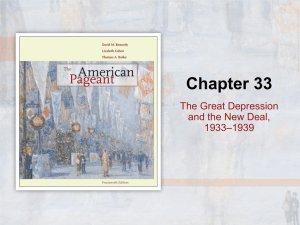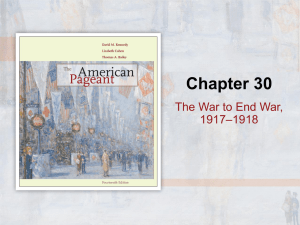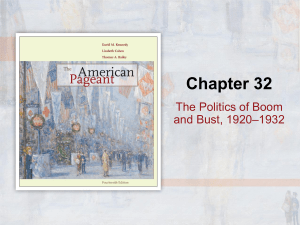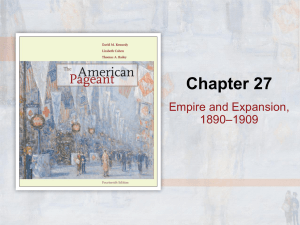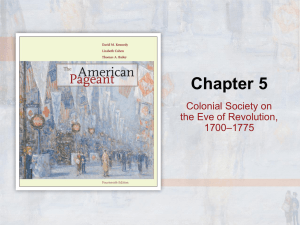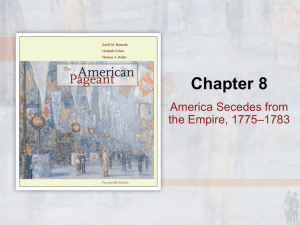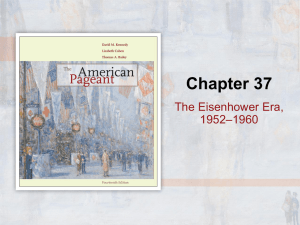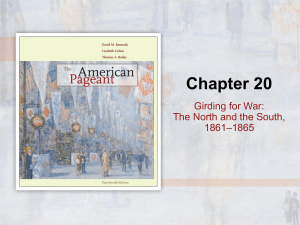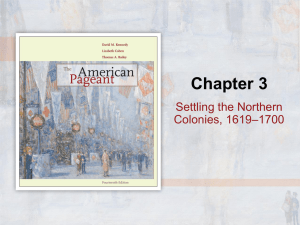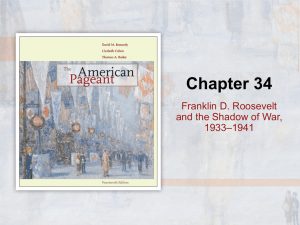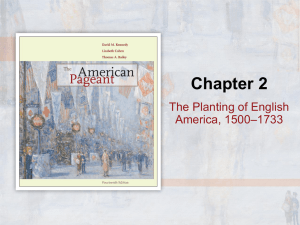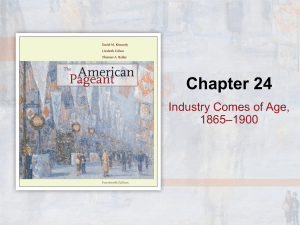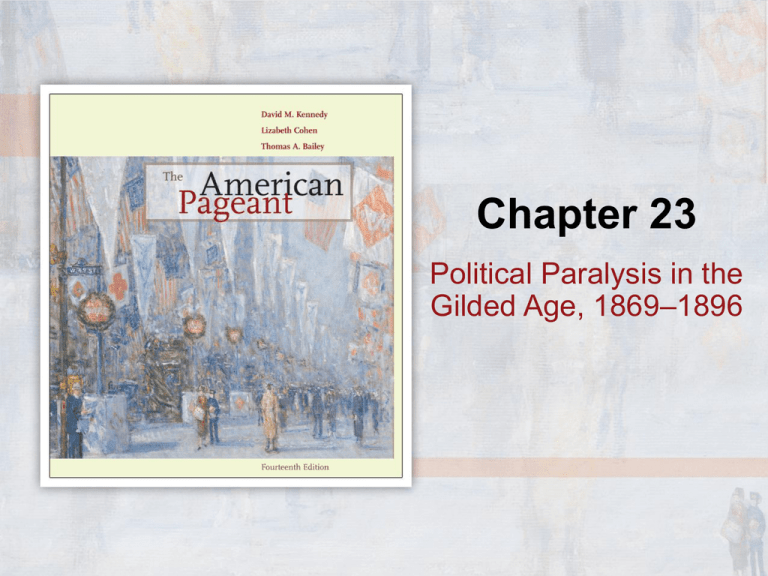
Chapter 23
Political Paralysis in the
Gilded Age, 1869–1896
Question
“Waving the bloody shirt” meant
a) exposing Ku Klux Klan terrorism.
b) decrying the use of anti-union strikebreakers.
c) reviving gory memories of the
Civil War.
d) lamenting the Triangle Shirtwaist Company
fire.
Copyright © Cengage Learning. All rights reserved.
23 | 2
Answer
“Waving the bloody shirt” meant
a) exposing Ku Klux Klan terrorism.
b) decrying the use of anti-union strikebreakers.
c) reviving gory memories of the
Civil War. (correct)
d) lamenting the Triangle Shirtwaist Company
fire.
Hint: See page 539.
Copyright © Cengage Learning. All rights reserved.
23 | 3
Question
All of following were true of the Tweed Ring
EXCEPT
a) it vividly displayed the ethics (or lack of ethics)
typical of the age.
b) Burly “Boss” Tweed employed bribery, graft, and
fraudulent elections to milk the metropolis of as
much as $200 million.
c) honest citizens were cowed into silence.
d) protesters found their tax assessments
lowered.
Copyright © Cengage Learning. All rights reserved.
23 | 4
Answer
All of following were true of the Tweed Ring
EXCEPT
a) it vividly displayed the ethics (or lack of ethics)
typical of the age.
b) Burly “Boss” Tweed employed bribery, graft, and
fraudulent elections to milk the metropolis of as
much as $200 million.
c) honest citizens were cowed into silence.
d) protesters found their tax assessments
lowered. (correct)
Hint: See pages 539–540.
Copyright © Cengage Learning. All rights reserved.
23 | 5
Question
The Crédit Mobilier scandal involved bribery and
inflated prices in the __________ industry.
a) railroad
b) shipping
c) mining
d) oil
Copyright © Cengage Learning. All rights reserved.
23 | 6
Answer
The Crédit Mobilier scandal involved bribery and
inflated prices in the __________ industry.
a) railroad (correct)
b) shipping
c) mining
d) oil
Hint: See page 541.
Copyright © Cengage Learning. All rights reserved.
23 | 7
Question
All of the following were true of the Panic of 1873 EXCEPT
a) it was one of those periodic plummets that roller-coastered the
economy in this age of unbridled capitalist expansion.
b) overreaching promoters had laid more railroad track, sunk
more mines, erected more factories, and sowed more
grainfields than existing markets could bear.
c) bankers had made too few imprudent loans to finance the
enterprises.
d) when profits failed to materialize, loans went unpaid, and the
whole credit-based house of cards fluttered down.
Copyright © Cengage Learning. All rights reserved.
23 | 8
Answer
All of the following were true of the Panic of 1873 EXCEPT
a) it was one of those periodic plummets that roller-coastered the
economy in this age of unbridled capitalist expansion.
b) overreaching promoters had laid more railroad track, sunk
more mines, erected more factories, and sowed more
grainfields than existing markets could bear.
c) bankers had made too few imprudent loans to finance the
enterprises. (correct)
d) when profits failed to materialize, loans went unpaid, and the
whole credit-based house of cards fluttered down.
Hint: See page 542.
Copyright © Cengage Learning. All rights reserved.
23 | 9
Question
All of the following were true of the Compromise of 1877
EXCEPT
a) the election deadlock itself was to be broken by the Electoral
Count Act, which Congress passed early in 1877.
b) it set up an electoral commission consisting of fifteen men
selected from the Senate, the House, and the Supreme Court.
c) the members agreed, by the partisan vote of eight
Democrats to seven Republicans, to accept the Democratic
returns.
d) the Democrats reluctantly agreed that Hayes might take office
in return for his withdrawing intrusive federal troops from the
South.
Copyright © Cengage Learning. All rights reserved.
23 | 10
Answer
All of the following were true of the Compromise of 1877
EXCEPT
a) the election deadlock itself was to be broken by the Electoral
Count Act, which Congress passed early in 1877.
b) it set up an electoral commission consisting of fifteen men
selected from the Senate, the House, and the Supreme Court.
c) the members agreed, by the partisan vote of eight
Democrats to seven Republicans, to accept the Democratic
returns. (correct)
d) the Democrats reluctantly agreed that Hayes might take office
in return for his withdrawing intrusive federal troops from the
South.
Hint: See pages 545–546.
Copyright © Cengage Learning. All rights reserved.
23 | 11
Question
All of the following were true of Jim Crow EXCEPT
a) it started as the informal separation of blacks and
whites in the immediate postwar years.
b) it developed, by the 1890s, into systematic statelevel legal codes of segregation.
c) Southern states also enacted literacy requirements,
voter-registration laws, and poll taxes.
d) the quality of African American life was relatively
equal to that of whites.
Copyright © Cengage Learning. All rights reserved.
23 | 12
Answer
All of the following were true of Jim Crow EXCEPT
a) it started as the informal separation of blacks and
whites in the immediate postwar years.
b) it developed, by the 1890s, into systematic statelevel legal codes of segregation.
c) Southern states also enacted literacy requirements,
voter-registration laws, and poll taxes.
d) the quality of African American life was relatively
equal to that of whites. (correct)
Hint: See page 547.
Copyright © Cengage Learning. All rights reserved.
23 | 13
Question
The Plessy v. Ferguson decision of 1896 ruled that
a) “separate but equal” facilities were unconstitutional under the
“equal protection” clause of the Fourteenth Amendment.
b) “separate but equal” facilities were constitutional
under the “equal protection” clause of the Fourteenth
Amendment.
c) “separate and unequal” facilities were unconstitutional under
the “equal protection” clause of the Fourteenth Amendment.
d) “separate and unequal” facilities were constitutional under the
“equal protection” clause of the Fourteenth Amendment.
Copyright © Cengage Learning. All rights reserved.
23 | 14
Answer
The Plessy v. Ferguson decision of 1896 ruled that
a) “separate but equal” facilities were unconstitutional under the
“equal protection” clause of the Fourteenth Amendment.
b) “separate but equal” facilities were constitutional
under the “equal protection” clause of the Fourteenth
Amendment. (correct)
c) “separate and unequal” facilities were unconstitutional under
the “equal protection” clause of the Fourteenth Amendment.
d) “separate and unequal” facilities were constitutional under the
“equal protection” clause of the Fourteenth Amendment.
Hint: See pages 547–548.
Copyright © Cengage Learning. All rights reserved.
23 | 15
Question
The Chinese Exclusion Act of 1882
a) prohibited nearly all immigration
from China.
b) stripped native-born Chinese Americans of their
citizenship.
c) invalidated the doctrine of “birthright citizenship” (or
jus soli, the “right of the soil.”
d) invalidated the doctrine of jus sanguinis, (the “right
of blood-tie,” which based citizenship on the parents’
nationality).
Copyright © Cengage Learning. All rights reserved.
23 | 16
Answer
The Chinese Exclusion Act of 1882
a) prohibited nearly all immigration
from China. (correct)
b) stripped native-born Chinese Americans of their
citizenship.
c) invalidated the doctrine of “birthright citizenship” (or
jus soli, the “right of the soil.”
d) invalidated the doctrine of jus sanguinis, (the “right
of blood-tie,” which based citizenship on the parents’
nationality).
Hint: See page 549.
Copyright © Cengage Learning. All rights reserved.
23 | 17
Question
All of the following were true of the Pendleton Act
of 1883 EXCEPT it
a) was passed in the wake of President Garfield’s
murder by a deranged office-seeker.
b) was known as the Magna Carta of civil-service
reform.
c) mandated compulsory campaign contributions from
federal employees.
d) established the Civil Service Commission to make
appointments to federal jobs on the basis of
competitive examinations rather than “pull.”
Copyright © Cengage Learning. All rights reserved.
23 | 18
Answer
All of the following were true of the Pendleton Act
of 1883 EXCEPT it
a) was passed in the wake of President Garfield’s
murder by a deranged office-seeker.
b) was known as the Magna Carta of civil-service
reform.
c) mandated compulsory campaign contributions from
federal employees. (correct)
d) established the Civil Service Commission to make
appointments to federal jobs on the basis of
competitive examinations rather than “pull.”
Hint: See page 553.
Copyright © Cengage Learning. All rights reserved.
23 | 19
Question
All of the following were true of the Homestead Strike
EXCEPT
a) officials at Andrew Carnegie’s Homestead steel plant near
Pittsburgh called in three hundred armed Pinkerton detectives
in July to crush it.
b) strikers, armed with rifles and dynamite, forced their assailants
to surrender after a vicious battle that left ten people dead and
some sixty wounded.
c) troops were eventually summoned, and both the strike and the
union were broken.
d) the strike resulted in the Populists welding a coalition of
aggrieved workers and indebted farmers in a revolutionary
assault capitalism.
Copyright © Cengage Learning. All rights reserved.
23 | 20
Answer
All of the following were true of the Homestead Strike
EXCEPT
a) officials at Andrew Carnegie’s Homestead steel plant near
Pittsburgh called in three hundred armed Pinkerton detectives
in July to crush it.
b) strikers, armed with rifles and dynamite, forced their assailants
to surrender after a vicious battle that left ten people dead and
some sixty wounded.
c) troops were eventually summoned, and both the strike and the
union were broken.
d) the strike resulted in the Populists welding a coalition of
aggrieved workers and indebted farmers in a revolutionary
assault capitalism. (correct)
Hint: See pages 557–558.
Copyright © Cengage Learning. All rights reserved.
23 | 21

